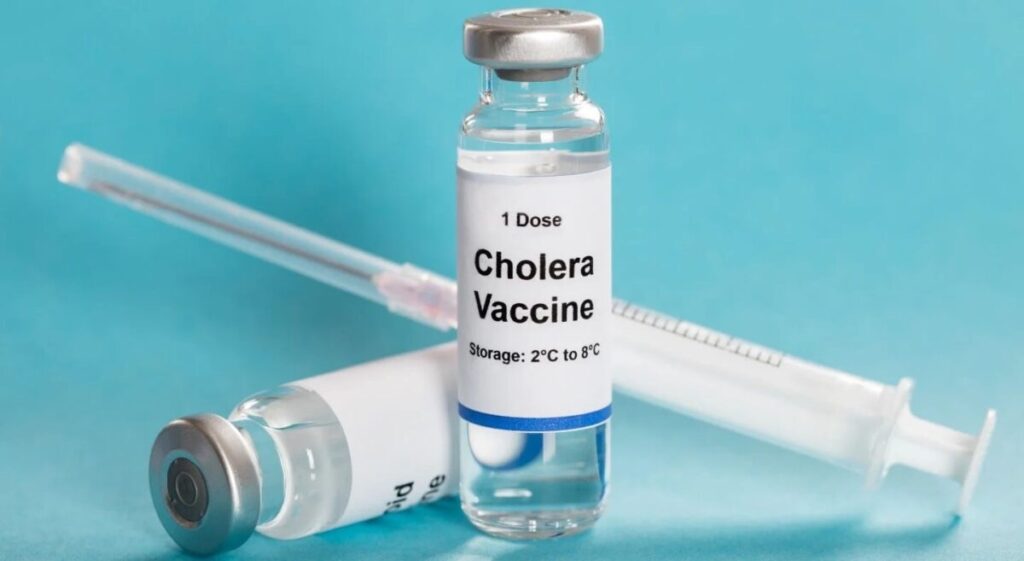The Global Alliance for Vaccines and Immunisation, Gavi, has announced that cholera vaccines will soon be delivered to Nigeria to help control the ongoing outbreak.
The federal government placed emergency order for the vaccines in June, in the wake of the cholera outbreak in the country.
Giving the update in a post on her X handle @SaniaNishtar the Chief Executive Officer of Gavi, The Vaccine Alliance, Dr Sania Nishtar, said the cholera vaccines will aid in combating the ongoing cholera outbreak in the country.

The post reads, ”Encouraged to learn that cholera vaccines from the Gavi-funded global vaccine stockpile will soon arrive in Nigeria to help curb the country’s deadly and ongoing outbreak.
“We stand ready to work with our partners UNICEF and WHO to support the Coordinating Minister of Health and Social Welfare, Prof Mohammed Ali Pate, the Federal Ministry of Health, and the Nigeria Centre for Diseases Control and Prevention, NCDC, in their timely efforts to contain this outbreak and protect those at the highest risk.
“Despite the large number of cholera outbreaks this year, our stockpile is now fully replenished, and production continues at maximum capacity. We hope to keep supporting cholera-affected countries with their control plans.”
Nishtar had expressed concern over the worsening condition of cholera outbreak in Nigeria restating Gavi’s commitment to supporting the country’s response efforts, including the provision of emergency vaccine doses.
Cholera is a severe, potentially epidemic, life-threatening diarrhea disease caused by the bacterium Vibrio cholerae. The oral cholera vaccine provides protection against cholera by stimulating the intestinal immune response.
In its latest update, the NCDC reported 3,623 suspected cholera cases and 103 deaths in 187 Local Government Areas, across 34 states, with a cumulative case fatality rate of 2.8 percent since the beginning of the year.
In a response also posted on his X handle, the Coordinating Minister of Health and Social Welfare, Prof Mohammed Ali Pate, acknowledged the Gavi’s facilitation of the vaccines.
Pate tweeted, “Thanks Dr Sania Nishtar for facilitating our early access to Gavi-funded cholera vaccines. We will deploy the vaccines efficiently and effectively in response to the ongoing outbreak.
“Thanks also to President Bola Tinubu for his astute leadership in setting up a multi-sector cabinet committee to support the Emergence Operations Centre led by the NCDC to work with our 36 states in a national response to the outbreak. We are seeing early signs of slowing down but we’ll not relent as the situation can reverse. So, the cholera vaccines strengthen our hands.”
Earlier, the minister disclosed that the Federal government rose to the challenge posed by the cholera outbreak by addressing the cases of poor sanitation, access to potable water, and contamination of water by fecal materials, and the cases have begun to plateau and trend downwards.
“President Bola Tinubu set up a cabinet committee through the NCDC and the Emergency Operations Center. We brought several ministries, with the Ministry of Water, Ministry of Environment, Ministry of Education, Ministry of Aviation, Ministries of Youth, Planning, and Finance, as part of this cabinet committee and each of those ministries did their own part, including the Ministry of Information, in terms of making people aware. Now, with those efforts, we’ve prevented a huge upsurge.
“It’s too early to say that we have concluded that the outbreak has ended. It’s too early, because the rainy season is just beginning in parts of the country. So we could see upsurge. But those efforts, we think, have contributed in taming the cholera outbreak, We’re on the verge of getting oral cholera vaccines approved, we went proactively and got it.
“So in the case of cholera, we are very watchful we are ready, and the President had enabled the NCDC with the resources to reposition, and all the states where we have found cases have received support from the federal government in terms of case management, and in terms of information, so that we deal with it. That is what we’ve done about it. So we should be vigilant.”
On open defecation, Pate stressed that it was essential to ensure that food and water are not contaminated.
“Once people have diarrhea or have vomited, they quickly get taken to treatment centers, and for health workers to identify them, to rehydrate them, and to treat them so that they don’t succumb to the disease.
“Our vaccines response is dynamic. The more cases we find, the more we need to treat them. If we don’t find cases, then the burden on treatment will not be as much. So for us, it’s to ensure that we make effort to detect every case,” he affirmed.
Olaitan Ibrahim